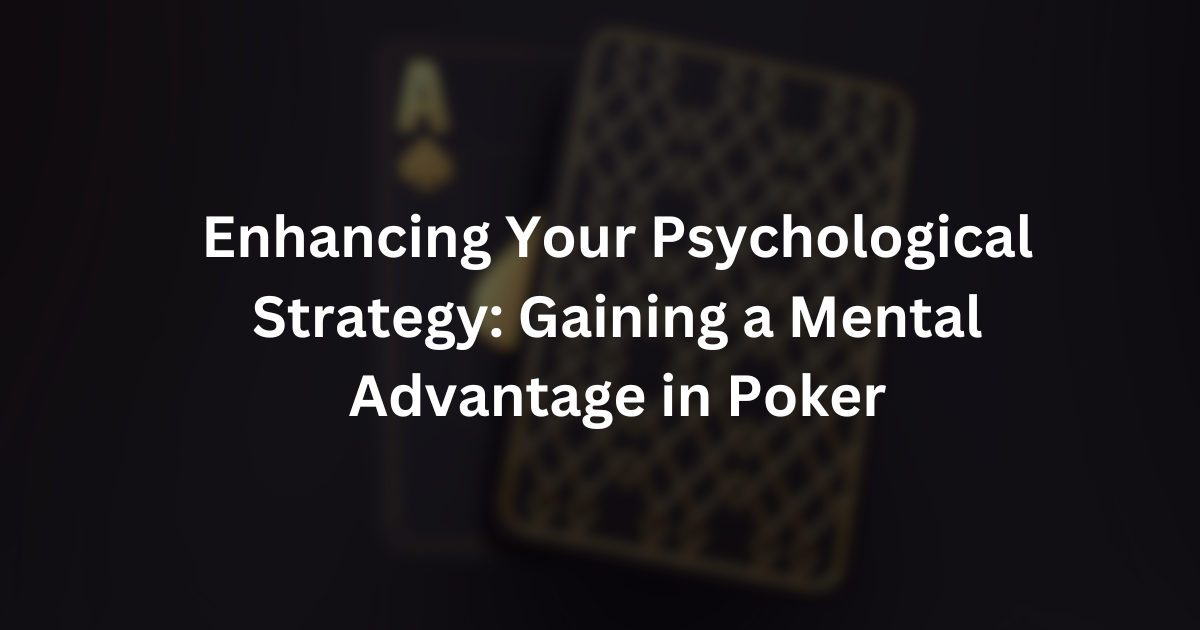
Poker is frequently depicted as a cerebral contest of strategies and wits. However, an element often overlooked, yet equally crucial, is its mental aspect. It’s a game where psychological finesse can transform a skilled player into an extraordinary one, transcending the allure of a royal flush or the excitement of a strategic bluff. This exploration delves into poker’s mental intricacies, a key factor in elevating a player’s prowess.
The Psychological Battleground of Poker
Envision poker as a strategic chess game where emotions are the pieces, and the board is a constantly evolving landscape of psychological interplay. Players come to the table armed not only with cards and chips but also with a unique mental makeup shaped by their life experiences, temperament, and resilience.
Tilt: The Poker Player’s Adversary
Central to the mental game in poker is the phenomenon of ’tilt’ – a state where emotions eclipse logic. Triggered by a bad beat, consecutive losses, or a mishandled hand, tilt can spiral into a series of impulsive decisions and substantial losses. Recognizing early signs of tilt, like frustration or aggression, and taking proactive steps to mitigate its impact, such as stepping away or practicing calming techniques, are crucial for maintaining control.
The Balance of Confidence
Confidence in poker is essential, yet delicate. It drives daring plays and thoughtful risks but can also lead to underestimating opponents if left unchecked. Cultivating a balanced confidence involves study, practice, and self-analysis, enabling players to navigate the fine line between assurance and overconfidence.
Embracing Variance: The Stoic’s Challenge
Variance – the natural ebbs and flows in poker – tests a player’s mental strength. Adopting a stoic mindset, acknowledging variance as an inherent part of the game, and focusing on decision-making rather than immediate outcomes are vital for enduring these fluctuations.
Mental Flexibility: The Key to Dynamic Play
The ever-changing dynamics of a poker table require mental agility. Adapting strategies to suit the current game environment, reading the table’s mood, and adjusting play styles are akin to a chameleon adapting to changing surroundings.
Resilience: Learning from Adversity
Resilience in poker goes beyond recovering from a tough game. It encompasses analyzing mistakes, learning from them, and applying these lessons to future plays. Like tempered steel, resilience in poker comes from enduring and growing stronger through challenges.
Mindfulness: The Power of the Present
Staying focused and mindful is a formidable tool. Mindfulness means being fully engaged in the present, not dwelling on past plays or future concerns. Practices like meditation can sharpen focus and decision-making abilities, essential for peak performance.
Emotional Intelligence: Deciphering Opponents
Poker is as much about reading opponents as it is about cards. Emotional intelligence, the skill of discerning and responding to one’s own and others’ emotions, can provide a significant edge. It’s about noticing subtle cues and understanding the emotional states of opponents to make informed decisions.
The Long Game: A Strategic Vision
Maintaining a long-term view is crucial for mental well-being in poker. It involves setting long-term goals, tracking progress, and not getting swayed by short-term setbacks, recognizing that poker is a marathon, not a sprint.
Mastering Poker’s Inner Game
The mental aspect of poker is a tapestry woven from psychological strategies, emotional management, and mental endurance. Mastering this facet requires commitment, self-awareness, and continuous personal growth. Building a mental toolkit encompassing resilience, focus, emotional intelligence, and a stoic acceptance of variance is key to becoming not just a poker player, but a poker champion.
